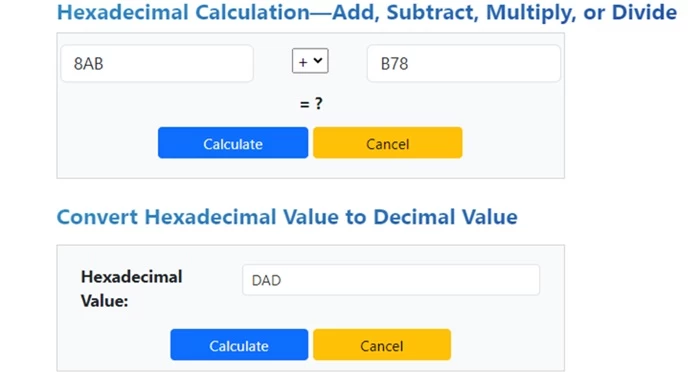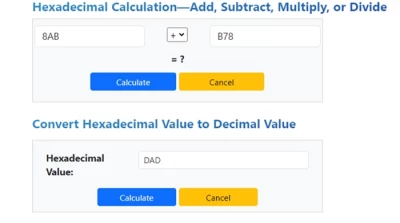The Significance of Hex Calculators in Science and Technology
Explore Hex Calculators and their precision. See how these helpful tools make work faster in science and technology, changing the ways scientists, engineers, and programmers do tasks.

In the world of science and technology that's constantly changing, being really accurate is super important. Imagine scientists and tech experts trying to figure out really tricky stuff - it's like they're solving a giant puzzle with lots of pieces. And guess what helps them a ton? Numbers! There's this unique way of using numbers called the hexadecimal system. It's like an excellent tool that has 16 different options, kind of like having 16 colours in a crayon box. This number system is super handy for all sorts of professionals in other jobs.
How Hex Numbers Found Their Place in the Spotlight?
Before we delve into the significance of hex calculators, let's journey back in time to understand how hexadecimal numbers became a vital part of our digital landscape. The concept of hexadecimal encoding can be traced back to the early days of computing, with IBM introducing it in the 1960s. The hexadecimal system, with its sixteen digits (0-9 and A-F), provided a concise and easily readable representation of binary-coded values. This made it a natural choice for programmers and engineers working with binary data. As computers became more prevalent, the hexadecimal system gained prominence, particularly in the fields of programming and digital electronics. Its ease of conversion from and to binary, combined with its compact representation, made it an ideal choice for low-level programming tasks.
Hex Calculator
Now that we've set the stage let's turn our attention to the star of the show - the hex calculator. This digital marvel simplifies complex operations involving hexadecimal numbers, making it an invaluable asset for scientists, engineers, and programmers alike. Anyone working with hexadecimal numbers can simplify their tasks by utilizing a hexadecimal calculator, enhancing efficiency and reducing complexity in their endeavours. It comes with the following features.
Fundamental Operations With Hex Numbers
Hex calculators, much like their decimal counterparts, perform basic arithmetic operations with hexadecimal numbers. Addition, subtraction, multiplication, and division become seamless tasks, allowing professionals to focus on the logic of their calculations rather than wrestling with manual conversions.
Hexadecimal to Decimal Calculator
One of the standout features of hex calculators is their ability to convert between hexadecimal and decimal numbers effortlessly. This is particularly handy when dealing with diverse systems that may use different number bases. For instance, imagine a computer scientist working on a complex algorithm that involves both hexadecimal and decimal representations. A hex calculator becomes their go-to companion, ensuring a smooth transition between these numerical languages.

Applications of Hexadecimal Calculator
-
Research Technology
In the world of scientific research, precision is paramount. Scientists often find themselves working with hexadecimal representations, especially when dealing with raw binary data. Hex calculators become indispensable tools, allowing researchers to perform complex computations with ease. Whether it's analyzing genetic sequences or processing data from particle accelerators, the precision and efficiency offered by hex calculators make them a staple in the toolkit of researchers pushing the boundaries of knowledge.
-
Computers Speak Hex
Behind the sleek interfaces and user-friendly applications lie the intricate workings of computers, often communicated in the language of hexadecimal. Computer programmers, when debugging or optimizing code, frequently need to manipulate hexadecimal values. A hex calculator serves as their trusty ally, ensuring that the intricate dance between bits and bytes unfolds seamlessly.
-
Science in Hex
From designing intricate circuitry to optimizing algorithms, scientists across various disciplines find themselves immersed in the world of hexadecimal. Hex calculators become essential companions in laboratories and research institutions, aiding scientists in decrypting the language of machines and ensuring the accuracy of their calculations.
-
Coding and Decoding Computer Languages
Programming languages often involve hex values, especially in low-level programming tasks. Whether it's decoding machine instructions or encoding cryptographic keys, hex calculators play a crucial role in the world of coding. Programmers appreciate the efficiency and speed that hex calculators bring to their workflows, allowing them to focus on the logic and functionality of their code. Visit CoolCalculator to find a collection of calculators catering to different needs and make your calculations hassle-free.

In the world of science and technology that's constantly changing, being really accurate is super important. Imagine scientists and tech experts trying to figure out really tricky stuff - it's like they're solving a giant puzzle with lots of pieces. And guess what helps them a ton? Numbers! There's this unique way of using numbers called the hexadecimal system. It's like an excellent tool that has 16 different options, kind of like having 16 colours in a crayon box. This number system is super handy for all sorts of professionals in other jobs.
How Hex Numbers Found Their Place in the Spotlight?
Before we delve into the significance of hex calculators, let's journey back in time to understand how hexadecimal numbers became a vital part of our digital landscape. The concept of hexadecimal encoding can be traced back to the early days of computing, with IBM introducing it in the 1960s. The hexadecimal system, with its sixteen digits (0-9 and A-F), provided a concise and easily readable representation of binary-coded values. This made it a natural choice for programmers and engineers working with binary data. As computers became more prevalent, the hexadecimal system gained prominence, particularly in the fields of programming and digital electronics. Its ease of conversion from and to binary, combined with its compact representation, made it an ideal choice for low-level programming tasks.
Hex Calculator
Now that we've set the stage let's turn our attention to the star of the show - the hex calculator. This digital marvel simplifies complex operations involving hexadecimal numbers, making it an invaluable asset for scientists, engineers, and programmers alike. Anyone working with hexadecimal numbers can simplify their tasks by utilizing a hexadecimal calculator, enhancing efficiency and reducing complexity in their endeavours. It comes with the following features.
Fundamental Operations With Hex Numbers
Hex calculators, much like their decimal counterparts, perform basic arithmetic operations with hexadecimal numbers. Addition, subtraction, multiplication, and division become seamless tasks, allowing professionals to focus on the logic of their calculations rather than wrestling with manual conversions.
Hexadecimal to Decimal Calculator
One of the standout features of hex calculators is their ability to convert between hexadecimal and decimal numbers effortlessly. This is particularly handy when dealing with diverse systems that may use different number bases. For instance, imagine a computer scientist working on a complex algorithm that involves both hexadecimal and decimal representations. A hex calculator becomes their go-to companion, ensuring a smooth transition between these numerical languages.

Applications of Hexadecimal Calculator
-
Research Technology
In the world of scientific research, precision is paramount. Scientists often find themselves working with hexadecimal representations, especially when dealing with raw binary data. Hex calculators become indispensable tools, allowing researchers to perform complex computations with ease. Whether it's analyzing genetic sequences or processing data from particle accelerators, the precision and efficiency offered by hex calculators make them a staple in the toolkit of researchers pushing the boundaries of knowledge.
-
Computers Speak Hex
Behind the sleek interfaces and user-friendly applications lie the intricate workings of computers, often communicated in the language of hexadecimal. Computer programmers, when debugging or optimizing code, frequently need to manipulate hexadecimal values. A hex calculator serves as their trusty ally, ensuring that the intricate dance between bits and bytes unfolds seamlessly.
-
Science in Hex
From designing intricate circuitry to optimizing algorithms, scientists across various disciplines find themselves immersed in the world of hexadecimal. Hex calculators become essential companions in laboratories and research institutions, aiding scientists in decrypting the language of machines and ensuring the accuracy of their calculations.
-
Coding and Decoding Computer Languages
Programming languages often involve hex values, especially in low-level programming tasks. Whether it's decoding machine instructions or encoding cryptographic keys, hex calculators play a crucial role in the world of coding. Programmers appreciate the efficiency and speed that hex calculators bring to their workflows, allowing them to focus on the logic and functionality of their code. Visit CoolCalculator to find a collection of calculators catering to different needs and make your calculations hassle-free.
Conversation
Latest Blogs
© Blog CoolCalculator, Explore CoolCalculator, your destination for the latest insights, tips, and updates on the world of online calculators. Stay informed and make your calculations smarter with our blog. ,
Designed
by Saad Media Team , Team Lead M.Rizwan Akhtar












